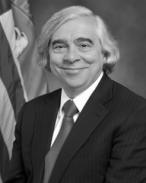Moniz Cyber Warning
Racing to Shore Up Defenses

|
BY MARTIN ROSENBERG Editor-in-chief, EnergyBiz |
Energy infrastructure is the target of more than half of the cyberattacks that have hit the United States, warns U.S. Energy Secretary Ernest Moniz. He said that more must be done to secure Americaís grid from both severe weather disruptions and cyberassaults. In addition, other power security issues are top priority for the secretary and the Obama administration. Moniz responded to our questions about energy security at the Plattís Global Energy Outlook Forum in New York last month. Energy security is the focus of the upcoming EnergyBiz Secure Power Forum in Washington, March 3-4.

EnergyBiz: Many energy leaders believe the U.S. will experience a major cyberattack that will threaten to bring down the power grid. Do you agree?

|
|
Moniz: Thereís no question. There is certainly not an ďifĒ when it comes to cyberattacks. I am not willing to concede on bringing the grid down. But thatís the race that we are in to try to shore up our defenses. We know itís tough. Itís a moving target. We have a lot of work to do.
EnergyBiz: What about the threats posed to grid reliability by increasingly severe weather?
Moniz: We were giving a larger focus to the resilience of infrastructure. What we want to do is relook at the spectrum of threats to the energy infrastructure. It is extreme weather. Itís cyber. Itís physical attacks on infrastructure. In the future it could be EMP, electromagnetic pulses. In addition, we believe thereís an additional risk from the interdependence of different infrastructures. A good example was during Hurricane Sandy when there were unanticipated consequences caused by the strong interaction between the electricity grid and the transportation fuel supply. The Northeast was not short on fuel. It was short on the ability to get it out of storage, distribute it and deliver it. On the cybersecurity front, the Obama administration has been favorably disposed to having a cyber bill in the Congress. That has not happened at this stage. Under the Federal Emergency Management Agency, there is a whole set of emergency support functions throughout the government with different leads. Energy is whatís called ESF12, which means energy infrastructure. Cybersecurity is part of that. We have a working group with utility CEOs looking at cybersecurity. Weíve even taken the steps of giving some temporary security clearances to a subset of cyber CEOs.
EnergyBiz: What is your bottom line concern?
Moniz: Over half of the cyberattacks in the last several years in the United States have been on energy infrastructure.
Copyright © 1996-2014 by CyberTech, Inc. All rights reserved.
To subscribe or visit go to: http://www.energycentral.com
To subscribe or visit go to: http://www.energybiz.com